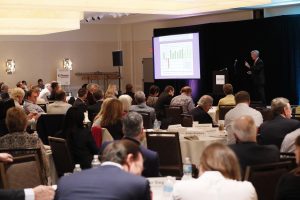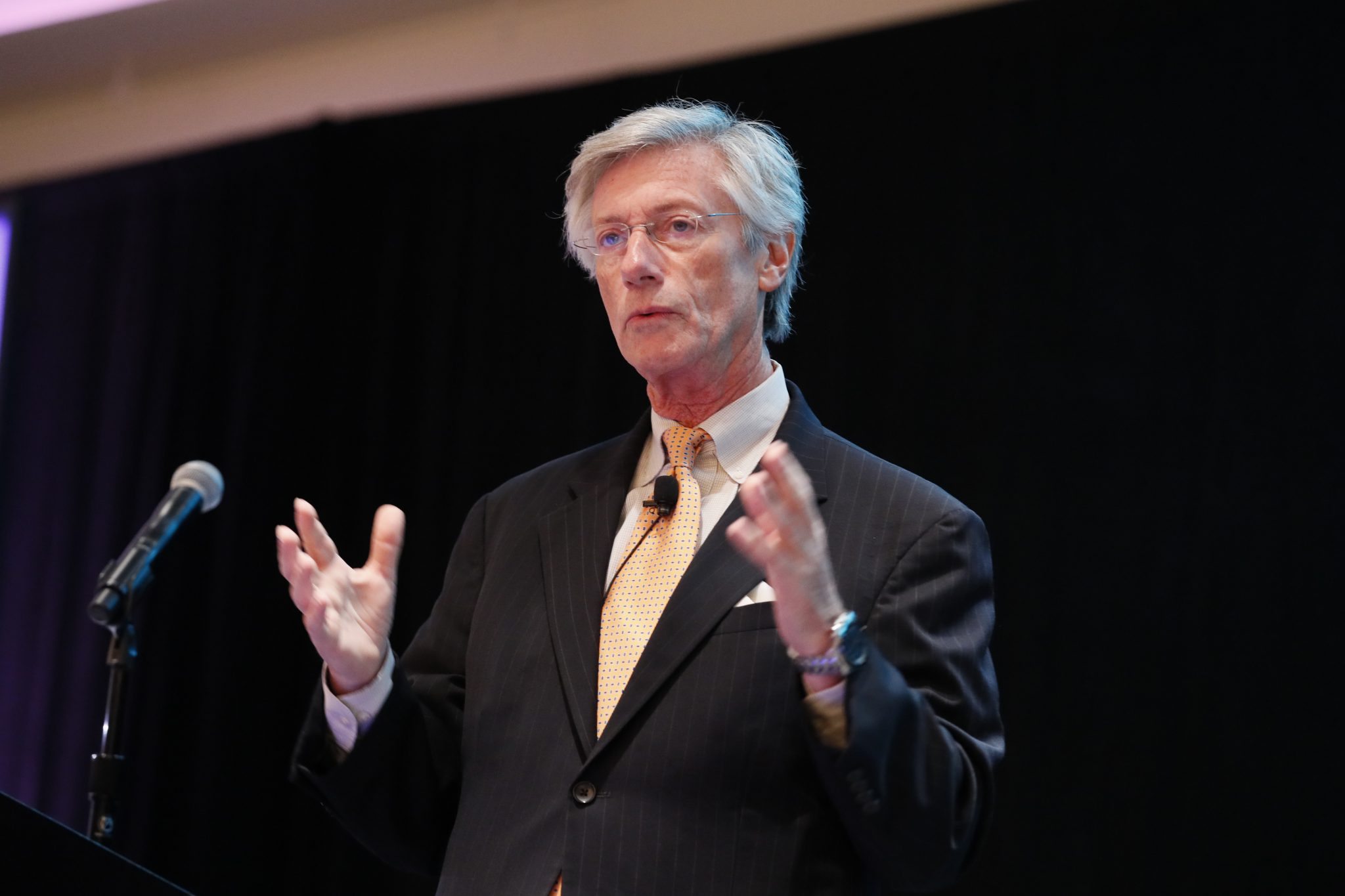After lunch and information about the services offered by CHESS sponsor companies, Bernard Baumohl presented a thought-provoking analysis of current domestic and international economic and political conditions. Baumohl, chief global economist at The Economic Outlook Group, based in Princeton, NJ, specializes in economic analysis, forecasting and geopolitical risk assessment. The firm’s principal goal is to anticipate economic events and identify potential domestic and international risks that can significantly alter the business and financial climate.
Baumohl began by stating in these challenging times, we can no longer use traditional economic models, we need a more holistic view and must look at the many inputs. We must become political economists to interpret contradictory trends and paradoxical conditions. All economic forecasts for the U.S. must reveal expectations for who will occupy the White House in January 2017.
First, the Economic Good News
Baumohl began by assuring the audience that many indicators are favorable. Domestically, U.S. economic fundamentals are strong, employment and income are improving, government spending will accelerate and post-Brexit worries are subsiding. Internationally, the global cost of borrowing will remain low, China’s leaders will avoid a crash landing; Europe and Asia are still expected to grow. Assuming Hillary Clinton wins the election, we see the odds of U.S. recession less than 25% through 2018, with the economy picking up momentum. Viewing the U.S economy as a table with four legs: consumer spending, government spending, trade, and business capital spending, he would address each topic.
In the consumer market, the main drivers of household spending are strong: the job market continues to improve, household balance sheets stabilized, and household net worth is at a high. Wages are rising faster than inflation for more purchasing power and consumer confidence has increased. Employers are having a hard time filling job needs. Thanks to the improving economy, demand for housing is rising. Mortgage rates remain low and home inventories are tight.

Somewhat Good News
- Aged U.S. capital equipment needs updating. The long slump in business capital spending will end in 2017. Total U.S. private fixed capital is the oldest in 60 years. Aircraft is 10+ years old, communication equipment is the oldest ever. Aged manufacturing facilities surpass the 1946 peak. Lodging structures are the oldest since 1961.
- Federal Reserve will resume raising rates in December. Still, the cost of borrowing will remain historically low.
- Demand for crude is still strong, and oil prices will hover in the $50 – $60 range in 2017 as production slides in the U.S., Nigeria and Venezuela and with OPEC edging closer to an agreement on output.
Global Growth Predictions
- Growth Leaders: India, Indonesia, China, Vietnam and Sub-Saharan Africa with rising middle classes.
- Modest growth expected for the U.S., Canada, EU, Sweden and Mexico.
- In or near recession: Russia, Brazil, Venezuela, Japan, United Kingdom.
Geopolitical Trouble Spots to Watch: Don’t Be Blindsided
The geopolitical pot is boiling furiously and Baumohl alerted the audience to mounting global threats.
The strangest presidential campaign in U.S. modern history has resulted in massive uncertainty about future economic, trade and foreign policies. He compared the positions of Donald Trump and Hillary Clinton on personal income taxes, corporate taxes, spending increases, spending reductions, trade, immigration and other policies and concludes that Clinton’s economic plan will generate faster growth than Trump’s.
Trade Agreements in Play
Baumohl then compared economic aspects of the Trans Pacific Partnership (TTP), which involves the U.S. and 11 Pacific Rim nations (but not China) and the Trans-Atlantic Trade and Investment Partnership (TTIP), which affects the U.S. and European Union nations. The TTP is the largest multi-national trade agreement in history with huge economic and geopolitical impact. Both sets of agreements are impacted by U.S. election year politics.
The TTIP has also been slowed by events in Europe such as the weak economies of some of its member countries, loss of trade with Russia due to sanctions over its actions in Ukraine, plummeting exports to China and emerging countries, the stress of absorbing millions of refugees from the Middle East, terrorist strikes and Brexit consequences.
Brexit has a relatively small impact for the U.S., as our exports to the UK represent less than 1% of US GDP and our exports to EU represent for less than 3% of U.S. GDP.
Some U.S. firms will encounter hardships because BREXIT has raised the dollar’s value, which may affect trade competitiveness and U.S. companies (mostly financial services) that relied on UK as a gateway to EU now face relocation costs.
However, the fall in the Pound lowers the price of UK financial and real estate assets. American companies will benefit as France, Belgium and Germany offer attractive incentives for U.S. subsidiaries to relocate to their cities.
Monitor Global Risks
As recent worldwide events have shown, shocks will be more frequent and more consequential. All businesses now bear exposure to event risk and should take steps to prepare.
Geopolitical eruptions cause damage in these main ways:
- Terrorists favor soft targets: shopping malls, theme parks and airports, affecting consumer psychology.
- Financial contagion. Global financial markets are integrated. Shocks can instantly destabilize capital markets and restrict access to credit lines.
- Oil prices. Geopolitical eruptions are often transmitted through sharp swings in the cost of crude, especially if they originate in the Middle East.
- Supply chain networks. Firms that rely on a global supply chain system could suffer lengthy disruptions in production, inventory and sales of goods.

Highest Probability Threats to Growth
CYBERTHREATs from foreign hackers
Costly in time and money to discover and recover from breaches.
SAUDI ARABIA
Terrorists strike the Kingdom and its energy infrastructure.
CHINA
- Economic and Western Pacific risks
- Economic and social upheavals. Expect government will do anything to avoid instability and rising joblessness. U.S. exports to the China account for just 0.7% of U.S. GDP. U.S. key trading partners will suffer more than the U.S, as 32 countries depend on China to buy more than 20% of their exports.
- China pursues aggressive hegemonic control over western Pacific. 55% of world’s merchant fleet tonnage pass here, 32% of all oil shipments, 65% of all natural gas shipments. China has ignored international law and set up dangerous conditions for conflicts and confrontations in this critical region.
RUSSIA
Tensions build over Syria, Ukraine and NATO forces in Eastern Europe. History has shown that Russia will exploit Western vulnerabilities, especially in the lame duck sessions of a U. S. presidency and the early months of a new presidency.
IRAN
Suspicion grows that Iran is cheating on the nuclear accord and ballistic missile tests.
Power struggle and civil conflict between factions in advance of May 2017 elections.
EUROPE
Terrorist cells focus their attacks against popular /tourist venues. Fear disrupts economic activity.
NORTH KOREA
ICBM capability to deliver nuclear warheads anywhere. Sells know-how to Iran.
Companies Must Prepare for Risk
- Test out “What if” scenarios – Where is your firm most vulnerable?
Undertake rigorous stress tests. Expose the company to a variety of adverse hypothetical scenarios, events that could disrupt your supply chain network.
- Anticipate event risk
Which assets are at greatest risk? Dedicate a management team to monitor the fast-changing geopolitical and economic environment where the firm’s assets and client base are exposed.This team should not only identify company-sensitive hot spots globally —but prepare scenarios and probabilities on how events in those regions may evolve.
- Be proactive. A firm’s reputation is at stake.
Prepare in advance a governance plan that can be implemented to mitigate the harmful fallout from an external shock. Your customers depend on you.
Conclusions
- No recession in sight for the U.S.—at least through 2018.
- U.S. GDP to grow 2.0% – 3% average next three years.
- U.S. to remain the bright spot in the global economy
- Oil prices to stabilize by mid-2016, then slowly climb.
- U.S. dollar to hold steady in foreign exchange markets.
- Post-election relief, low-interest rates, cheap fuel prices
- Stable dollar will boost consumer and business spending.
Bernard Baumohl left the audience with several intriguing questions to ponder:
- Who will next occupy the White House? Future of domestic and foreign policies?
- Financial turmoil in China. Social unrest.
- Military confrontation in western Pacific.
- Destabilization inside Saudi Arabia.
Taking questions from the audience, Baumohl addressed foreign currency fluctuations, health care costs as a percentage of consumer disposable income, China’s risk of economic collapse, commercial construction activity, and labor market needs for skills.
Widely recognized for his forecasting accuracy, his economic and geopolitical projections have been frequently cited in major business and general interest publications and on television. He has been a commentator on public television’s Nightly Business Report. He teaches at the New York Institute of Finance and has lectured at major universities.
Mr. Baumohl was an award-winning economics reporter with TIME magazine who covered the White House, Federal Reserve and Wall Street. His classic best-seller, The Secrets of Economic Indicators: Hidden Clues to Future Economic Trends and Investment Opportunities, Wharton School Publishing, 2005, has helped investors, business strategists, and policymakers worldwide translate the massive flow of economic data into knowledge for intelligent decision-making. Now in its third edition, Wall Street Journal called this book “…the real deal,” saying it “miraculously breathes life into economic indicators and statistics” for professionals who need to understand the true meaning of the latest economic trends.
To learn more about Bernard Baumohl, visit www.economicoutlookgroup.com



